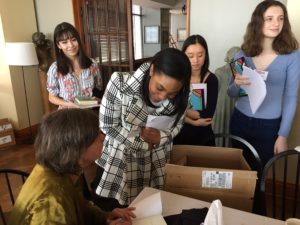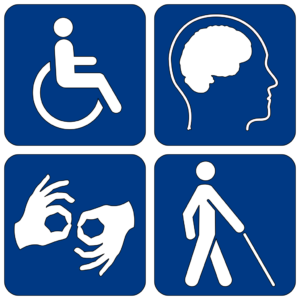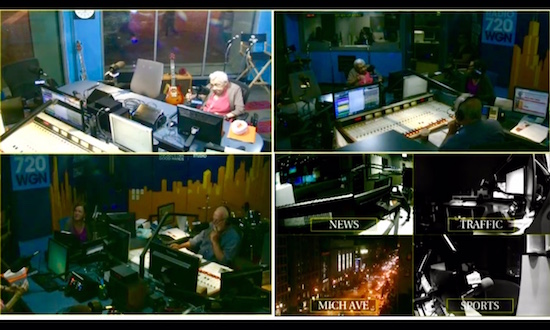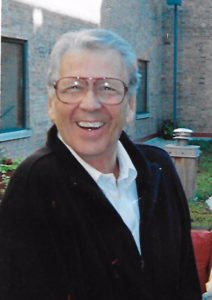Come have a nosh at our Max and Benny’s book gig — Just One Month Away!
August 16, 2019 • 8 Comments • Posted in book tour, careers/jobs for people who are blind, memoir writing, public speaking, teaching memoir Good news! I’ve been invited to give an Author Night Presentation about Writing Out Loud at Max and Benny’s Deli Restaurant in Northbrook! Even better news: the event is free, all you need to do is register.
Good news! I’ve been invited to give an Author Night Presentation about Writing Out Loud at Max and Benny’s Deli Restaurant in Northbrook! Even better news: the event is free, all you need to do is register.
- When: September 16th, 2019 7 pm – 8:30 pm
- Where: Max and Benny’s Restaurant, Deli and Bakery
461 Waukegan Rd
Northbrook, IL 60062
847-272-9490

Chicago high school girls were invited to the Cliff Dwellers event, too, and I had the privilege of talking to each one as I autographed their books. (Photo: Dana Ellenby-Bergeron).
Here’s the back story: After hearing the presentation I gave for the International Women’s Day celebration at Chicago’s Cliff Dwellers Club last March, Richard Reader, the perfectly-named creator and coordinator of the Chicago Jewish Authors Literary Series at Max and Benny’s, asked if I’d be willing to come to the deli to talk about Writing Out Loud. I’d love to, I said. “But I’m not Jewish!” Richard waved that concern off. “Some of your writers in that book are Jewish,” he said. “You’re in!”
I’d been hearing about the Jewish Author Literary Series at Max and Benny’s for years. A well-attended (yet casual) gathering, the literary series welcomes listeners to nosh during the presentation. I just checked out the menu – gefilte fish, kiske, hot pastrami sandwiches, half chicken in the pot, you name it. The Book Bin, and independent bookstore in Northbrook, will have copies of Writing Out Loud on hand for me to sign afterwards as well.
But wait. There’s more! Two Beth Finke Memoir Teacher MasterClass graduates will be there with me to talk a bit about the memoir-writing classes they are leading now: Heidi Reeves has a class starting at the Blackstone branch of the Chicago Public Library in the Kenwood neighborhood on Chicago’s South Side, and Sharon Kramer teaches memoir-writing for members of Chicago’s Skyline Village.
I hope you’ll come. How can you resist?! I’ll leave you here with my bio from the Max and Benny’s Jewish Author Literary Series web site. For More information, email events@maxandbennys.com or call 847.272.9490.
Author Beth Finke will be featured at Max and Benny’s! Beth Finke met her husband in journalism school, and both planned on long careers as newspaper reporters.
But then the spots showed up. A year later, at age 26, Beth was blind.
The Americans with Disabilities Act had not been passed yet, and Beth’s career path took some major detours — including a long stint working as a nude model for university art students.Her persistence paid off, though.
The recipient of a writing fellowship from the National Endowment for the Arts, Beth is the author of three published books. Her radio essays air on NPR, and her writing appears everywhere from Cheryl Sandberg’s OptionB to Hollywood’s Variety Magazine. The Lisagor Award she won for a 2005 essay she recorded about the World Champion White Sox put her in a class of her own: she is the only blind woman in America to win an award for sports Broadcasting.
Beth’s latest book, Writing Out Loud, is a look at how leading memoir-writing classes for Chicagoans 60 and better help her continue living the fun, creative and pleasurable life she always has.
Beth lives in the Printers Row neighborhood of Chicago with her husband, Mike Knezovich, and her Seeing Eye dog, Whitney.
And she no longer models nude for art students.


